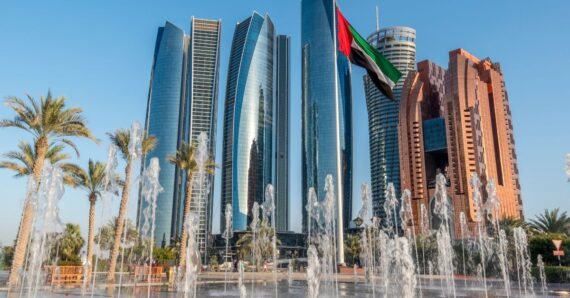Living and Working in Abu Dhabi: is It best in 2025?
Working in Abu Dhabi sounds intriguing and has become one of the popular destinations to grab new oppurtunities, ensuring high quality of life.
Speaking of it, the tax-free salaries and diverse culture is the main attractions of expats and ensuring them to relocate.
In this article, we’ll explore the various aspects of living and working in Abu Dhabi, addressing common questions and concerns faced by expats considering a move to this vibrant city.
Is Abu Dhabi a Good Place to Work and Live?
Abu Dhabi offers a unique blend of modern amenities, traditional values, and exciting opportunities, making it an attractive option for many expats.
The city boasts a strong economy driven by the oil and gas industry, as well as a growing non-oil sector. This economic stability, combined with tax-free salaries, makes Abu Dhabi an appealing place to work and save money.
In terms of quality of life, Abu Dhabi provides a safe and clean environment, with a low crime rate and excellent healthcare facilities.
The city also offers a wide range of leisure activities, from shopping in world-class malls to exploring cultural attractions and enjoying outdoor adventures in the desert or on the beautiful beaches.

How Much Salary Is Enough to Live in Abu Dhabi?
The cost of living in Abu Dhabi is relatively high compared to many other cities, but this is offset by the tax-free salaries and often generous expat packages.
The salary required to live comfortably in Abu Dhabi depends on various factors, such as your lifestyle, family size, and housing preferences.
On average, a single expat can live comfortably on a monthly salary of around AED 10,000 to AED 15,000 (approximately USD 2,700 to USD 4,000).
For families with a monthly salary of AED 20,000 to AED 30,000 (approximately USD 5,400 to USD 8,100) or more may be necessary to cover expenses such as housing, schooling, and transportation.
You can also determine it using the Abu Dhabi Living Cost Calculator.
Is Abu Dhabi Worth Living in?
Whether Abu Dhabi is worth living in depends on your personal preferences and priorities. Many expats find that the high standard of living, safety, and financial benefits make Abu Dhabi an attractive place to call home.
The city offers a diverse range of experiences, from modern urban living to traditional Emirati culture, and provides opportunities for career growth and personal development.
However, some expats may find the conservative nature of the society and the hot desert climate challenging.
It’s essential to research and carefully consider your own needs and expectations before deciding to move to Abu Dhabi.
Regret Moving to Abu Dhabi
While many expats have positive experiences living in Abu Dhabi, and some may face challenges that lead to regret.
Common reasons for regret include difficulty adapting to the local culture, feeling isolated from friends and family back home, or struggling to find a sense of community.
To minimize the risk of regret, it’s essential to prepare yourself mentally and emotionally for the move, research the city thoroughly, and make an effort to build a support network once you arrive.
Joining expat groups, participating in community events, and maintaining open communication with your employer can help ease the transition and create a more positive experience.
And now you also have the Abu Dhabi resident’s office, which is quite helpful, especially if you’re a new expat.
Living in Abu Dhabi as a Woman Abu Dhabi is generally considered a safe and welcoming place for women, with many expat women living and working in the city. However, it’s essential to be aware of and respect the local customs and dress codes, which tend to be more conservative than in many Western countries.
Women in Abu Dhabi are expected to dress modestly in public, covering their shoulders and knees. It’s also important to be mindful of behaviour and interactions with men, as public displays of affection are not accepted.
Despite these cultural differences, many expat women find that they can enjoy a high quality of life in Abu Dhabi, with access to excellent healthcare, education, and career opportunities.
Abu Dhabi Expat Salary Package
Expat salary packages in Abu Dhabi can vary depending on factors such as your industry, job role, and level of experience. In addition to a tax-free salary, many expat packages include benefits such as:
- Housing allowance or company-provided accommodation
- Health insurance for the employee and their dependents
- Annual flight tickets to the employee’s home country
- Education allowance for children
- Transportation allowance
- End-of-service gratuity
When negotiating your salary package, it’s essential to consider the total value of the benefits offered and how they align with your needs and expectations.
Cost of Living in Abu Dhabi
The cost of living in Abu Dhabi is relatively high, particularly when it comes to housing and education. Renting an apartment in a popular expat area can range from AED 50,000 to AED 200,000 (approximately USD 13,600 to USD 54,500) per year, depending on the size and location.
Education costs for expat children can also be substantial, with annual fees for international schools ranging from AED 30,000 to AED 100,000 (approximately USD 8,200 to USD 27,200) or more per child.
Other expenses, such as groceries, dining out, and utilities, are generally more affordable compared to housing and education. However, it’s essential to budget carefully and consider your circumstances when assessing the cost of living in Abu Dhabi.
Living in Abu Dhabi vs Dubai , the two largest cities in the UAE, offer distinct experiences for expats. While both cities provide modern amenities, tax-free salaries, and a high standard of living, there are some notable differences:
- Pace of Life: Abu Dhabi is generally considered to have a more relaxed and laid-back atmosphere compared to the fast-paced, bustling energy of Dubai.
- Cost of Living: While both cities have a high cost of living, Abu Dhabi is generally considered to be slightly more affordable than Dubai, particularly when it comes to housing.
- Job Opportunities: Dubai is known for its thriving tourism, real estate, and finance industries, while Abu Dhabi’s economy is largely driven by the oil and gas sector, as well as government-related jobs.
- Cultural Experiences: Abu Dhabi tends to have a more traditional and conservative cultural environment compared to Dubai, which is known for its cosmopolitan and international vibe.
Ultimately, the choice between living in Abu Dhabi or Dubai depends on your personal preferences, job opportunities, and desired lifestyle.
Pros and Cons of Living in Abu Dhabi Like any city, living in Abu Dhabi has its advantages and disadvantages. Some of the main pros and cons include:
Pros:
- Tax-free salaries and generous expat packages
- High standard of living and modern amenities
- Safe and clean environment with low crime rates
- Excellent healthcare and education systems
- Diverse cultural experiences and leisure activities
Cons:
- High cost of living, particularly for housing and education
- Conservative cultural norms and dress codes
- Hot and humid climate, with temperatures reaching up to 50°C (122°F) in summer
- Potential for feeling isolated or homesick, particularly for expats from Western countries
- Limited public transportation options and heavy reliance on cars
Living in Abu Dhabi with Family Abu Dhabi can be a great place to raise a family, with a safe environment, excellent education options, and a range of family-friendly activities.
Many expat families appreciate the opportunity to provide their children with a unique cultural experience and exposure to a diverse international community.
However, it’s essential to consider the cost of education and housing when moving to Abu Dhabi with a family. Researching schools, housing options, and community resources can help ensure a smooth transition for the whole family.
Living in Abu Dhabi as a Single Woman Single women can enjoy a fulfilling and independent life in Abu Dhabi, with opportunities for career growth, personal development, and social connections. The city offers a range of activities and events for women, including fitness classes, book clubs, and professional networking groups.
However, single women should be aware of the conservative cultural norms and dress codes in Abu Dhabi and take appropriate precautions to ensure their safety and well-being.
Building a support network of friends and colleagues can also help single women navigate the challenges and opportunities of living in Abu Dhabi.
Conclusion – Living and working in Abu Dhabi
Living and working in Abu Dhabi can be a rewarding and exciting experience for expats, offering a unique blend of modern amenities, cultural experiences, and financial benefits.
By carefully considering the various aspects of life in Abu Dhabi, from job opportunities and cost of living to cultural norms and personal preferences, expats can make an informed decision about whether this vibrant city is the right fit for them.
With the proper preparation, mindset, and support network, expats can thrive in Abu Dhabi and make the most of the opportunities this dynamic city has to offer.






